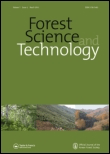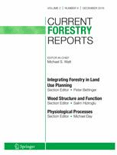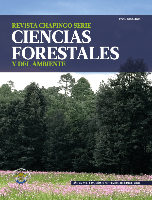
Forest Science and Technology
Scope & Guideline
Exploring the intersection of forestry and technology for a greener future.
Introduction
Aims and Scopes
- Forest Ecology and Biodiversity:
Research on ecological dynamics, biodiversity conservation, and the role of forests in sustaining ecosystems is a core focus. This includes studies on forest species composition, genetic diversity, and the impact of environmental changes on forest health. - Sustainable Forest Management:
The journal emphasizes sustainable practices in forest management, exploring techniques that balance ecological integrity with economic viability. This includes studies on harvesting methods, land-use changes, and forest policy implications. - Agroforestry and Land Use Systems:
Agroforestry practices that integrate trees into agricultural landscapes are a significant area of study, highlighting their potential for enhancing biodiversity, improving soil health, and supporting rural livelihoods. - Climate Change and Resilience:
Research addressing the impacts of climate change on forests, including carbon dynamics, adaptation strategies, and the role of forests in climate mitigation, is increasingly prominent. - Forest Restoration and Rehabilitation:
The journal covers research on restoration practices for degraded forest ecosystems, focusing on techniques that enhance biodiversity and ecosystem services. - Technological Innovations in Forestry:
There is a focus on the application of new technologies, such as remote sensing, GIS, and machine learning, to improve forest management practices and monitoring.
Trending and Emerging
- Impact of Climate Change on Forest Dynamics:
An increasing number of studies are focusing on how climate change affects forest ecosystems, including species distribution, growth patterns, and overall forest health, reflecting a growing concern for climate resilience. - Forest Ecosystem Services:
Research examining the various services provided by forest ecosystems, such as carbon sequestration, water filtration, and recreational opportunities, is gaining prominence as society recognizes the value of sustainable forest management. - Community-Based Forest Management:
There is a rising trend in research related to community engagement in forest management, emphasizing local knowledge and practices that contribute to sustainable livelihoods and conservation. - Technological Advances in Forest Monitoring:
The application of advanced technologies, such as drones, remote sensing, and AI for forest monitoring and management, is becoming increasingly prevalent, showcasing the integration of technology in forestry. - Restoration Ecology:
Research focused on ecological restoration practices, particularly in degraded forest areas, is on the rise, highlighting the importance of restoring biodiversity and ecosystem services.
Declining or Waning
- Traditional Timber Production Methods:
Research centered on conventional timber harvesting and production methods has seen a decrease. As sustainable practices and alternative forest products gain traction, traditional approaches are being overshadowed. - Forest Fire Management:
The focus on forest fire dynamics and management strategies has waned, likely due to a shift towards broader climate change impacts and ecological resilience rather than solely fire management. - Invasive Species Studies:
While still relevant, the frequency of studies specifically targeting invasive species within forest ecosystems appears to have diminished, possibly due to a broader focus on overall biodiversity and ecosystem health. - Historical Forest Management Practices:
Historical analyses of forest management practices are less frequently published, as current research trends lean towards contemporary issues and forward-looking sustainable practices.
Similar Journals

Lesnoy Zhurnal-Forestry Journal
Connecting Global Scholars for Sustainable Forestry SolutionsLesnoy Zhurnal-Forestry Journal is a prominent academic publication dedicated to advancing the field of forestry and environmental sciences. Published by the Northern Arctic Federal University M. V. Lomonosov, this journal focuses on innovative research, practices, and policies related to forestry management and conservation. With an Open Access model established since 2015, the journal ensures widespread dissemination of knowledge and foster collaborative research across global scholarly communities. Located in Arkhangelsk, Russia, the Lesnoy Zhurnal appeals to researchers, professionals, and students alike, providing a platform for sharing valuable insights and addressing emerging challenges in forestry. Though specific metrics like HIndex and Scopus rankings are presently unlisted, the journal is committed to excellence and aims to enhance its visibility and impact within the scientific community. This publication is not only a critical resource for ongoing research but a key player in shaping sustainable forestry practices in a rapidly changing environment, making it indispensable for anyone involved in forestry and environmental studies.

Current Forestry Reports
Exploring the intersection of ecology and practical forestry.Current Forestry Reports, published by Springer International Publishing AG, stands at the forefront of forestry and ecological research, boasting an impressive array of quartile rankings in 2023 such as Q1 in Ecology and Forestry. With an ISSN of 2198-6436, this journal has emerged as a pivotal platform for disseminating innovative research findings and insights critical to the sustainable management of forest ecosystems. Operating out of Switzerland, it covers a broad scope that spans from ecological theory to practical forestry applications and landscape conservation. Notably, it ranks #3 out of 174 in Agricultural and Biological Sciences: Forestry and #4 out of 211 in Environmental Science: Nature and Landscape Conservation, reflecting its high impact and relevance in the field, placing it in the top percentiles in multiple categories. This open-access journal endeavors to provide a comprehensive understanding of contemporary issues, trends, and methodologies in forestry and related disciplines, making it an indispensable resource for researchers, practitioners, and students who are dedicated to advancing knowledge and practices in forest science.

Forestist
Innovating ecological research for a greener tomorrow.Forestist, published by AVES, is a pivotal open-access journal dedicated to the field of Forestry, providing a platform for researchers, professionals, and students to explore cutting-edge developments and research within the discipline since 1980. Operating from Turkey, this journal offers a unique opportunity for scholars to share their findings with a broad audience, contributing to the global discourse on sustainable forest management, conservation practices, and ecological research. With an impressive impact factor and a current categorization in the Q3 quartile for 2023, Forestist ranks among the essential resources in Agricultural and Biological Sciences, particularly within the realm of Forestry, as indicated by its Scopus ranking of #119 out of 174 journals. This publication is committed to fostering open access to knowledge, making research freely available while encouraging innovative studies that address the pressing challenges in forestry and environmental science.

Revista Chapingo Serie Ciencias Forestales y del Ambiente
Elevating the discourse on forest and environmental sciences.Revista Chapingo Serie Ciencias Forestales y del Ambiente, published by Universidad Autónoma Chapingo, serves as a prominent platform for scholars and practitioners in the fields of Ecology and Forestry. Established in 2001, this open access journal has made significant strides in disseminating research that addresses pressing environmental issues, particularly within the Mexican context. With an ISSN of 2007-3828 and E-ISSN of 2007-4018, it has been recognized for its contributions, earning a Q3 ranking in both Ecology and Forestry categories as of 2023. The journal is pivotal in fostering collaboration and knowledge exchange among researchers, professionals, and students dedicated to understanding and preserving forest ecosystems. Access to its rich content is unrestricted, enhancing visibility and impact for innovative research and practical applications in sustainable management and conservation practices.

BALTIC FORESTRY
Championing Research for a Greener TomorrowBALTIC FORESTRY, published by the INST FORESTRY LRCAF in Lithuania, is a prominent academic journal that serves as a platform for disseminating cutting-edge research in the field of forestry. With an ISSN of 1392-1355, this journal is dedicated to advancing knowledge on sustainable forest management, ecological impacts, and resource conservation, among other vital topics. As of 2023, it has been categorized in the Q3 quartile for forestry in Scopus, indicating its solid reputation among peer-reviewed publications, ranking #95 out of 174 in the realm of Agricultural and Biological Sciences. BALTIC FORESTRY features contributions from researchers across the globe and encourages innovative approaches to solving contemporary challenges in forestry, making it an essential resource for professionals, scholars, and students alike. Although it operates under subscription-based access options, the journal's commitment to fostering academic discourse is unwavering, aiming to bridge the gap between theory and practice in forest science.

Floresta e Ambiente
Empowering knowledge for a sustainable future in forestry.Floresta e Ambiente is a pioneering open-access journal dedicated to advancing knowledge in forestry and environmental science, published by the Federal Rural University of Rio de Janeiro's Institute of Forests. Since its inception in 2012, this journal has emerged as a crucial platform for researchers, professionals, and students to disseminate innovative findings and foster discussions on sustainable forest management, conservation practices, and the ecological significance of forests in Brazil and beyond. With an impressive impact factor and a commendable ranking in the SCOPUS database, positioned in the 49th percentile of the Agricultural and Biological Sciences category, Floresta e Ambiente actively supports the dissemination of high-quality research while contributing to the global discourse on forestry. As an open access journal since 2013, it ensures that valuable knowledge is readily available to all, enhancing collaboration and engagement within the scientific community.

CANADIAN JOURNAL OF FOREST RESEARCH
Exploring sustainable solutions for forest ecosystems.Canadian Journal of Forest Research (ISSN: 0045-5067, E-ISSN: 1208-6037), published by Canadian Science Publishing, stands as a leading platform for disseminating cutting-edge research in the field of forestry and ecological sciences. With an impressive impact factor and a steady reputation for high-quality publications, this journal occupies a prestigious position indicated by its Q1 ranking in Forestry and Q2 in Ecology as of 2023, alongside commendable placements in global and planetary change studies. Covering a broad scope from sustainable forest management to the impacts of climate change on forest ecosystems, the journal encourages submissions that address contemporary challenges and innovations in forest research. Operating from its base in Ottawa, Canada, the Canadian Journal of Forest Research has been a cornerstone of academic discourse since 1974, offering researchers and professionals vital access to pioneering studies that inform policy and practice in forestry. Researchers, educators, and students alike will find this journal an indispensable resource for advancing knowledge and fostering collaboration in the vital realm of forest research.

Revista Cubana de Ciencias Forestales
Nurturing interdisciplinary dialogue in environmental sciences.Revista Cubana de Ciencias Forestales, published by UNIV PINAR RIO HERMANOS SAIZ MONTES OCA, is a vital resource in the field of forestry and environmental sciences. Since its inception in 2013, this Open Access journal has dedicated itself to disseminating high-quality research and innovations pertinent to forest ecology, sustainable management, and conservation strategies within the Cuban context and beyond. The journal aims to foster academic dialogue among researchers, professionals, and students by providing a platform for the sharing of interdisciplinary studies that address contemporary challenges in forestry. With its commitment to accessibility, Revista Cubana de Ciencias Forestales ensures that knowledge is available to a global audience, thereby contributing to the advancement of forest sciences and ecological awareness.

Sumarski List
Illuminating Trends and Practices in Forest ManagementSumarski List, published by the Croatian Forestry Society, serves as a key platform for the dissemination of knowledge and research within the field of forestry. Established in the early 1980s, this journal has maintained a consistent commitment to advancing the understanding of forest management, ecology, and conservation. With an ISSN of 0373-1332 and an E-ISSN of 1846-9140, it provides researchers and practitioners with valuable insights into current trends and practices in forestry, although it currently falls within the Q4 category in the 2023 forestry rankings. The journal is accessible primarily in printed format, promoting rigorous scholarship and discussion. The important contributions of Sumarski List are vital for fostering a greater appreciation of forestry in Croatia and beyond, making it an essential resource for those dedicated to tackling the pressing challenges in forest ecosystems.

Sylwan
Shaping the future of forestry through dedicated research.Sylwan, published by POLSKIE TOWARZYSTWO LESNE, is a key journal in the field of forestry, focusing on the science and practice of sustainable forest management and conservation. Operating since 1979 and releasing issues periodically, including those from 2011 to 2018 and from 2020 to 2024, this journal plays a vital role in disseminating research and advances in forestry practices particularly relevant to Poland and the broader European context. While currently not offering open access options, Sylwan maintains a Q4 ranking in the forestry category according to the Scopus database, highlighting its dedicated niche within the scientific community. The journal serves as an essential resource for researchers, professionals, and students seeking to enhance their understanding of forestry issues in a global and ecological framework. With a commitment to promoting innovative research, Sylwan supports the ongoing dialogue on forestry management and policies, ultimately contributing to the sustainable development of forest resources.